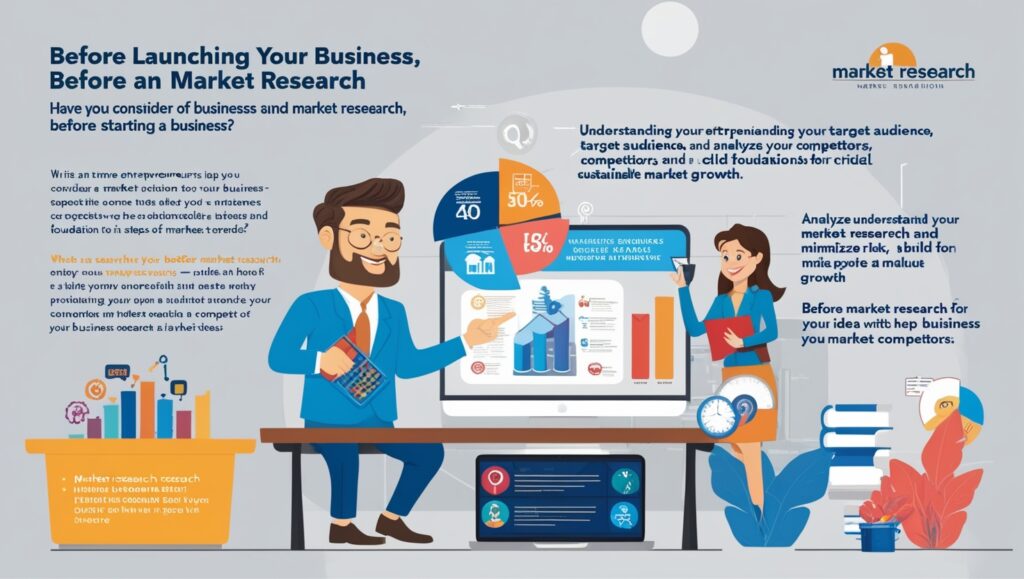Market Research Before Starting a Business
Starting a business is an exciting venture, but diving into it without understanding the market is like sailing without a compass. Market research is the critical process of gathering, analyzing, and interpreting information about a target market, competitors, and customer preferences. Market Research Before Starting a Business It lays the foundation for informed decision-making and can significantly increase your chances of success.
In this blog, we’ll explore why market research is essential before starting a business, the steps involved, and how it impacts your entrepreneurial journey.
Why Market Research is Crucial
- Understanding Your Target Audience
One of the primary objectives of market research is to identify and understand your target audience. This includes demographic factors such as age, gender, income level, education, and location, as well as psychographic elements like interests, lifestyle, and buying behaviors.- Example: If you’re starting a fitness brand, knowing whether your target audience prefers in-person classes or online sessions can shape your offerings.
- Identifying Market Demand
Market research helps you gauge whether there is sufficient demand for your product or service. Market Research Before Starting a Business Launching a business in a saturated or uninterested market could lead to financial losses.- Example: A survey or focus group could reveal whether people would pay for a meal delivery service specializing in plant-based meals in your area.
- Spotting Gaps and Opportunities
Research uncovers unmet needs in the market or areas where competitors are falling short. These gaps can be turned into opportunities for innovation.- Example: You might find that while there are many coffee shops in your city, none cater specifically to remote workers with ample power outlets and fast Wi-Fi.
- Assessing Competitors
Competitor analysis is a crucial part of market research. Understanding what others in your industry are doing, their strengths and weaknesses, and their pricing strategies allows you to position your business effectively.- Example: A competitive analysis could show that your competitors lack a strong social media presence, giving you a chance to capitalize on digital marketing.
- Minimizing Risks
Starting a business always involves risk, but market research reduces the likelihood of costly mistakes. By understanding customer needs and market trends, you can make informed decisions and avoid trial-and-error pitfalls.
Steps to Conduct Effective Market Research
- Define Your Goals
Determine what you need to know. Are you looking to validate your business idea, learn about competitors, or gauge pricing strategies? - Identify Your Target Market
Use surveys, interviews, or focus groups to understand your potential customers. Online tools like Google Analytics and social media insights can also provide valuable data. - Analyze Competitors
Research your competitors by reviewing their websites, customer reviews, pricing, and marketing strategies. Tools like SWOT (Strengths, Weaknesses, Opportunities, Threats) analysis can be helpful. - Collect Primary and Secondary Data
- Primary Data: Data collected directly from potential customers through surveys, interviews, and focus groups.
- Secondary Data: Existing information from market reports, industry studies, and government statistics.
- Analyze and Interpret the Data
Look for patterns and actionable insights in the data you’ve gathered. This step helps you make informed decisions about product offerings, pricing, and marketing strategies.
Benefits of Market Research
- Tailored Products and Services
Market research ensures that your products or services meet the specific needs of your target audience, making them more likely to succeed. - Effective Marketing Strategies
Knowing your audience allows you to craft personalized marketing campaigns that resonate with potential customers. - Setting Competitive Pricing
Research helps you determine pricing that is attractive to customers while remaining profitable. - Building a Strong Brand
Understanding customer preferences helps you create a brand identity that aligns with their values and aspirations.
Real-World Example
Consider a bakery looking to open in a busy neighborhood. Market Research Before Starting a Business Through market research, they discover that the area has a high population of health-conscious individuals. Armed with this knowledge, they decide to focus on organic, gluten-free, and vegan baked goods, filling a niche that competitors are not addressing. This targeted approach gives them a competitive edge.
Final Thoughts
Market research is not just a box to check before launching a business—it’s an ongoing process that evolves with your business and the market. Market Research Before Starting a Business It equips you with the knowledge to make informed decisions, adapt to changing trends, and meet customer needs effectively.
By investing time and resources in market research, you set the stage for a business that not only survives but thrives in today’s competitive landscape. If you’re ready to start your entrepreneurial journey, make market research your first step toward success.

